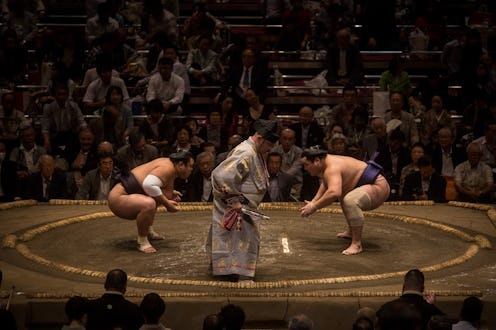News
Japanese Nurses Rushed Into A Sumo Ring To Give Aid — Then Were Ordered To Leave

Sumo, Japan's national sport, is rich in ancient traditions, but one of the sport's customs now is coming under fire. Sumo rings bar women, and that tradition became a hot topic after female medics were asked to leave a ring where they were providing medical care. Sumo tradition reportedly bars women from the ring, known as the dohyo, a space that's considered to be sacred. The Japan Sumo Association has since issued an apology.
Women rushed to provide emergency medical aid when Maizuru Mayor Ryozo Tatami suffered a brain hemorrhage and collapsed in the dohyo while delivering a speech Wednesday at a sumo tournament. According to The New York Times, one of the women was a nurse who performed CPR on the 66-year-old politician. In a video of the incident, a referee can be heard repeatedly demanding that the women come out of the ring.
Although sumo tradition dictates that women are forbidden from entering the dohyo, theories as to the origin of this tradition vary. According to Reuters, women are forbidden from entering the dohyo on the grounds their presence is "unclean" and might pollute the sacred space. The Japan Times reports the rule stems from "traditional Shinto and Buddhist beliefs" that menstruation makes women "impure." Another theory, according to The New York Times, concludes that women's presence in the ring would spark jealousy and rage in the goddesses of the harvest that sumo was reportedly meant to entertain, thus risking their wrath and a spoiled harvest.
The chairman of the Japan Sumo Association issued an apology Thursday, calling the referee's demand "an inappropriate response in a life-threatening situation," according to a Reuters translation (Tatami's condition was not reported to be life-threatening). The chairman also extended his "deepest appreciation" to the women who offered first aid.
A spokesperson for the city of Maizuru extended gratitude to the women. "We really appreciate the women who provided the first aid," the spokesperson said in a statement to CNN. "We don't know who they were, but would like to thank them directly."
Wednesday's incident isn't the first time a sumo official has been unwilling to bend the sport's traditions regarding women. In 2000, the then-governor of Osaka, who was Japan's first female governor, was barred from carrying out a long-standing honor of the office she'd just been elected to: crowning the winner of the Spring Grand Sumo Tournament. Despite the fact that the mayor of Osaka had crowned the winner in the dohyo every year since 1953, Fusae Ota was forbidden from entering the dohyo by the Japan Sumo Association, according to The New York Times.
In the late 1970s, the Japan Sumo Association rejected the entry of a 10-year-old girl who had advanced to the final round of a youth sumo competition on the grounds the sport did not allow women in the ring. According to ABC News, the Japan Sumo Association has previously said women can compete in the ring on an amateur level only.
But some within the sumo community are now criticizing the sport's traditional position regarding women in the dohyo. "I think it is all right for women to get on the ring when there is a reason to do so," sumo wrestling journalist Taro Arai told Reuters. "There is no historical ground or reason at all why they cannot."
The World Economic Forum ranked Japan 114th out of 144 countries in their 2017 global gender equality rankings. Previously the country had ranked 111th. According to The Japan Times, much of the country's slip in the rankings was due to a decline in women's political empowerment and representation.